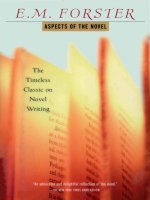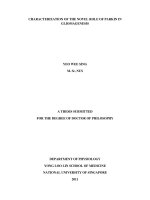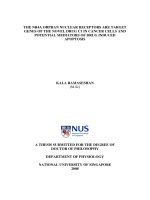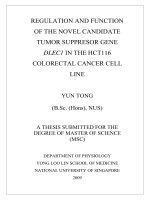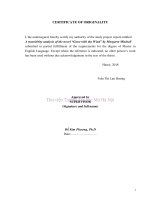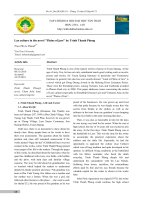the novel Emma
Bạn đang xem bản rút gọn của tài liệu. Xem và tải ngay bản đầy đủ của tài liệu tại đây (1.62 MB, 0 trang )
TheProjectGutenbergEBookofEmma,byJaneAusten
ThiseBookisfortheuseofanyoneanywhereatnocostandwith
almostnorestrictionswhatsoever.Youmaycopyit,giveitawayor
re-useitunderthetermsoftheProjectGutenbergLicenseincluded
withthiseBookoronlineatwww.gutenberg.org
Title:Emma
Author:JaneAusten
ReleaseDate:January21,2010[EBook#158]
LastUpdated:March10,2018
Language:English
***STARTOFTHISPROJECTGUTENBERGEBOOKEMMA***
ProducedbyAnAnonymousVolunteer,andDavidWidger
EMMA
ByJaneAusten
CONTENTS
VOLUMEI
CHAPTERI
CHAPTERII
CHAPTERIII
CHAPTERIV
CHAPTERV
CHAPTERVI
CHAPTERVII
CHAPTERVIII
CHAPTERIX
CHAPTERX
CHAPTERXI
CHAPTERXII
CHAPTERXIII
CHAPTERXIV
CHAPTERXV
CHAPTERXVI
CHAPTERXVII
CHAPTERXVIII
VOLUMEII
CHAPTERI
CHAPTERII
CHAPTERIII
CHAPTERIV
CHAPTERV
CHAPTERVI
CHAPTERVII
CHAPTERVIII
CHAPTERIX
CHAPTERX
CHAPTERXI
CHAPTERXII
CHAPTERXIII
CHAPTERXIV
CHAPTERXV
CHAPTERXVI
CHAPTERXVII
CHAPTERXVIII
VOLUMEIII
CHAPTERI
CHAPTERII
CHAPTERIII
CHAPTERIV
CHAPTERV
CHAPTERVI
CHAPTERVII
CHAPTERVIII
CHAPTERIX
CHAPTERX
CHAPTERXI
CHAPTERXII
CHAPTERXIII
CHAPTERXIV
CHAPTERXV
CHAPTERXVI
CHAPTERXVII
CHAPTERXVIII
CHAPTERXIX
VOLUMEI
CHAPTERI
EmmaWoodhouse,handsome,clever,andrich,withacomfortablehomeand
happydisposition,seemedtounitesomeofthebestblessingsofexistence;and
hadlivednearlytwenty-oneyearsintheworldwithverylittletodistressorvex
her.
She was theyoungestofthetwodaughtersofamostaffectionate,indulgent
father; and had, in consequence of her sister's marriage, been mistress of his
housefromaveryearlyperiod.Hermotherhaddiedtoolongagoforhertohave
more than an indistinct remembrance of her caresses; and her place had been
supplied by an excellent woman as governess, who had fallen little short of a
motherinaffection.
Sixteen years had Miss Taylor been in Mr. Woodhouse's family, less as a
governessthanafriend,veryfondofbothdaughters,butparticularlyofEmma.
Betweenthemitwasmoretheintimacyofsisters.EvenbeforeMissTaylorhad
ceasedtoholdthenominalofficeofgoverness,themildnessofhertemperhad
hardly allowed her to impose any restraint; and the shadow of authority being
now longpassed away, theyhadbeenlivingtogetherasfriendandfriend very
mutuallyattached,andEmmadoingjustwhatsheliked;highlyesteemingMiss
Taylor'sjudgment,butdirectedchieflybyherown.
The real evils, indeed, of Emma's situation were the power of having rather
too much her own way, and a disposition to think a little too well of herself;
these were the disadvantages which threatened alloy to her many enjoyments.
The danger, however, was at present so unperceived, that they did not by any
meansrankasmisfortuneswithher.
Sorrow came—a gentle sorrow—but not at all in the shape of any
disagreeable consciousness.—Miss Taylor married. It was Miss Taylor's loss
whichfirstbroughtgrief.Itwasonthewedding-dayofthisbelovedfriendthat
Emmafirstsatinmournfulthoughtofanycontinuance.Theweddingover,and
thebride-peoplegone,herfatherandherselfwerelefttodinetogether,withno
prospectofathirdtocheeralongevening.Herfathercomposedhimselftosleep
afterdinner,asusual,andshehadthenonlytositandthinkofwhatshehadlost.
The event had every promise of happiness for her friend. Mr. Weston was a
man of unexceptionable character, easy fortune, suitable age, and pleasant
manners;andtherewassomesatisfactioninconsideringwithwhatself-denying,
generousfriendshipshehadalwayswishedandpromotedthematch;butitwasa
blackmorning'sworkforher.ThewantofMissTaylorwouldbefelteveryhour
of every day. She recalled her past kindness—the kindness, the affection of
sixteenyears—howshehadtaughtandhowshehadplayedwithherfromfive
yearsold—howshehaddevotedallherpowerstoattachandamuseherinhealth
—andhownursedherthroughthevariousillnessesofchildhood.Alargedebtof
gratitudewasowinghere;buttheintercourseofthelastsevenyears,theequal
footing and perfect unreserve which had soon followed Isabella's marriage, on
their being left to each other, was yet a dearer, tenderer recollection. She had
beenafriendandcompanionsuchasfewpossessed:intelligent,well-informed,
useful,gentle,knowingallthewaysofthefamily,interestedinallitsconcerns,
and peculiarly interested in herself, in every pleasure, every scheme of hers—
one to whom she could speak every thought as it arose, and who had such an
affectionforherascouldneverfindfault.
Howwasshetobearthechange?—Itwastruethatherfriendwasgoingonly
half a mile from them; but Emma was aware that great must be the difference
between a Mrs. Weston, only half a mile from them, and a Miss Taylor in the
house;andwithallheradvantages,naturalanddomestic,shewasnowingreat
dangerofsufferingfromintellectualsolitude.Shedearlylovedherfather,buthe
was no companion for her. He could not meet her in conversation, rational or
playful.
The evil of the actual disparity in their ages (and Mr. Woodhouse had not
married early) was much increased by his constitution and habits; for having
been a valetudinarian all his life, without activity of mind or body, he was a
mucholdermaninwaysthaninyears;andthougheverywherebelovedforthe
friendliness of his heart and his amiable temper, his talents could not have
recommendedhimatanytime.
Her sister, though comparatively but little removed by matrimony, being
settledinLondon,onlysixteenmilesoff,wasmuchbeyondherdailyreach;and
many a long October and November evening must be struggled through at
Hartfield,beforeChristmasbroughtthenextvisitfromIsabellaandherhusband,
andtheirlittlechildren,tofillthehouse,andgiveherpleasantsocietyagain.
Highbury, the large and populous village, almost amounting to a town, to
which Hartfield, in spite of its separate lawn, and shrubberies, and name, did
really belong, afforded her no equals. The Woodhouses were first in
consequence there. All looked up to them. She had many acquaintance in the
place,forherfatherwasuniversallycivil,butnotoneamongthemwhocouldbe
acceptedinlieuofMissTaylorforevenhalfaday.Itwasamelancholychange;
and Emma could not but sigh over it, and wish for impossible things, till her
fatherawoke,andmadeitnecessarytobecheerful.Hisspiritsrequiredsupport.
Hewasanervousman,easilydepressed;fondofeverybodythathewasusedto,
and hating to part with them; hating change of every kind. Matrimony, as the
origin of change, was always disagreeable; and he was by no means yet
reconciledtohisowndaughter'smarrying,norcouldeverspeakofherbutwith
compassion,thoughithadbeenentirelyamatchofaffection,whenhewasnow
obligedtopartwithMissTaylortoo;andfromhishabitsofgentleselfishness,
andofbeingneverabletosupposethatotherpeoplecouldfeeldifferentlyfrom
himself,hewasverymuchdisposedtothinkMissTaylorhaddoneassadathing
forherselfasforthem,andwouldhavebeenagreatdealhappierifshehadspent
alltherestofherlifeatHartfield.Emmasmiledandchattedascheerfullyasshe
could,tokeephimfromsuchthoughts;butwhenteacame,itwasimpossiblefor
himnottosayexactlyashehadsaidatdinner,
“Poor Miss Taylor!—I wish she were here again. What a pity it is that Mr.
Westoneverthoughtofher!”
“I cannot agree with you, papa; you know I cannot. Mr. Weston is such a
good-humoured, pleasant, excellent man, that he thoroughly deserves a good
wife;—andyouwouldnothavehadMissTaylorlivewithusforever,andbear
allmyoddhumours,whenshemighthaveahouseofherown?”
“A house of her own!—But where is the advantage of a house of her own?
Thisisthreetimesaslarge.—Andyouhaveneveranyoddhumours,mydear.”
“Howoftenweshallbegoingtoseethem,andtheycomingtoseeus!—We
shallbealwaysmeeting!Wemustbegin;wemustgoandpayweddingvisitvery
soon.”
“Mydear,howamItogetsofar?Randallsissuchadistance.Icouldnotwalk
halfsofar.”
“No,papa,nobodythoughtofyourwalking.Wemustgointhecarriage,tobe
sure.”
“The carriage! But James will not like to put the horses to for such a little
way;—andwherearethepoorhorsestobewhilewearepayingourvisit?”
“TheyaretobeputintoMr.Weston'sstable,papa.Youknowwehavesettled
all that already. We talked it all over with Mr. Weston last night. And as for
James,youmaybeverysurehewillalwayslikegoingtoRandalls,becauseof
hisdaughter'sbeinghousemaidthere.Ionlydoubtwhetherhewillevertakeus
anywhere else. That was your doing, papa. You got Hannah that good place.
NobodythoughtofHannahtillyoumentionedher—Jamesissoobligedtoyou!”
“IamverygladIdidthinkofher.Itwasverylucky,forIwouldnothavehad
poor James think himself slighted upon any account; and I am sure she will
make a very good servant: she is a civil, pretty-spoken girl; I have a great
opinionofher.WheneverIseeher,shealwayscurtseysandasksmehowIdo,in
a very pretty manner; and when you have had her here to do needlework, I
observeshealwaysturnsthelockofthedoortherightwayandneverbangsit.I
amsureshewillbeanexcellentservant;anditwillbeagreatcomforttopoor
MissTaylortohavesomebodyaboutherthatsheisusedtosee.WheneverJames
goesovertoseehisdaughter,youknow,shewillbehearingofus.Hewillbe
abletotellherhowweallare.”
Emmasparednoexertionstomaintainthishappierflowofideas,andhoped,
bythehelpofbackgammon,togetherfathertolerablythroughtheevening,and
beattackedbynoregretsbutherown.Thebackgammon-tablewasplaced;buta
visitorimmediatelyafterwardswalkedinandmadeitunnecessary.
Mr.Knightley,asensiblemanaboutsevenoreight-and-thirty,wasnotonlya
veryoldandintimatefriendofthefamily,butparticularlyconnectedwithit,as
the elder brother of Isabella's husband. He lived about a mile from Highbury,
wasafrequentvisitor,andalwayswelcome,andatthistimemorewelcomethan
usual, as coming directly from their mutual connexions in London. He had
returned to a late dinner, after some days' absence, and now walked up to
Hartfield to say that all were well in Brunswick Square. It was a happy
circumstance,andanimatedMr.Woodhouseforsometime.Mr.Knightleyhada
cheerfulmanner,whichalwaysdidhimgood;andhismanyinquiriesafter“poor
Isabella” and her children were answered most satisfactorily. When this was
over,Mr.Woodhousegratefullyobserved,“Itisverykindofyou,Mr.Knightley,
to come out at this late hour to call upon us. I am afraid you must have had a
shockingwalk.”
“Notatall,sir.Itisabeautifulmoonlightnight;andsomildthatImustdraw
backfromyourgreatfire.”
“Butyoumusthavefounditverydampanddirty.Iwishyoumaynotcatch
cold.”
“Dirty,sir!Lookatmyshoes.Notaspeckonthem.”
“Well! that is quite surprising, for we have had a vast deal of rain here. It
rained dreadfully hard for half an hour while we were at breakfast. I wanted
themtoputoffthewedding.”
“Bythebye—Ihavenotwishedyoujoy.Beingprettywellawareofwhatsort
of joy you must both be feeling, I have been in no hurry with my
congratulations; but I hope it all went off tolerably well. How did you all
behave?Whocriedmost?”
“Ah!poorMissTaylor!'Tisasadbusiness.”
“PoorMr.andMissWoodhouse,ifyouplease;butIcannotpossiblysay'poor
MissTaylor.'IhaveagreatregardforyouandEmma;butwhenitcomestothe
questionofdependenceorindependence!—Atanyrate,itmustbebettertohave
onlyonetopleasethantwo.”
“Especiallywhenoneofthosetwoissuchafanciful,troublesomecreature!”
saidEmmaplayfully.“Thatiswhatyouhaveinyourhead,Iknow—andwhat
youwouldcertainlysayifmyfatherwerenotby.”
“Ibelieveitisverytrue,mydear,indeed,”saidMr.Woodhouse,withasigh.
“IamafraidIamsometimesveryfancifulandtroublesome.”
“My dearest papa! You do not think I could mean you, or suppose Mr.
Knightleytomeanyou.Whatahorribleidea!Ohno!Imeantonlymyself.Mr.
Knightleylovestofindfaultwithme,youknow—inajoke—itisallajoke.We
alwayssaywhatweliketooneanother.”
Mr. Knightley, in fact, was one of the few people who could see faults in
EmmaWoodhouse,andtheonlyonewhoevertoldherofthem:andthoughthis
wasnotparticularlyagreeabletoEmmaherself,sheknewitwouldbesomuch
less so to her father, that she would not have him really suspect such a
circumstanceashernotbeingthoughtperfectbyeverybody.
“Emma knows I never flatter her,” said Mr. Knightley, “but I meant no
reflectiononanybody.MissTaylorhasbeenusedtohavetwopersonstoplease;
shewillnowhavebutone.Thechancesarethatshemustbeagainer.”
“Well,” said Emma, willing to let it pass—“you want to hear about the
wedding;andIshallbehappytotellyou,forweallbehavedcharmingly.Every
bodywaspunctual,everybodyintheirbestlooks:notatear,andhardlyalong
face to be seen. Oh no; we all felt that we were going to be only half a mile
apart,andweresureofmeetingeveryday.”
“DearEmmabearseverythingsowell,”saidherfather.“But,Mr.Knightley,
sheisreallyverysorrytolosepoorMissTaylor,andIamsureshewillmissher
morethanshethinksfor.”
Emma turned away her head, divided between tears and smiles. “It is
impossiblethatEmmashouldnotmisssuchacompanion,”saidMr.Knightley.
“We should not like her so well as we do, sir, if we could suppose it; but she
knows how much the marriage is to Miss Taylor's advantage; she knows how
veryacceptableitmustbe,atMissTaylor'stimeoflife,tobesettledinahome
ofherown,andhowimportanttohertobesecureof acomfortableprovision,
andthereforecannotallowherselftofeelsomuchpainaspleasure.Everyfriend
ofMissTaylormustbegladtohavehersohappilymarried.”
“Andyouhaveforgottenonematterofjoytome,”saidEmma,“anda very
considerableone—thatImadethematchmyself.Imadethematch,youknow,
four years ago; and to have it take place, and be proved in the right, when so
manypeoplesaidMr.Westonwouldnevermarryagain,maycomfortmeforany
thing.”
Mr.Knightleyshookhisheadather.Herfatherfondlyreplied,“Ah!mydear,
I wish you would not make matches and foretell things, for whatever you say
alwayscomestopass.Praydonotmakeanymorematches.”
“Ipromiseyoutomakenoneformyself,papa;butImust,indeed,forother
people. It is the greatest amusement in the world! And after such success, you
know!—EverybodysaidthatMr.Westonwouldnevermarryagain.Ohdear,no!
Mr. Weston, who had been a widower so long, and who seemed so perfectly
comfortablewithoutawife,soconstantlyoccupiedeitherinhisbusinessintown
oramonghisfriendshere,alwaysacceptablewhereverhewent,alwayscheerful
—Mr.Westonneednotspendasingleeveningintheyearaloneifhedidnotlike
it. Oh no! Mr. Weston certainly would never marry again. Some people even
talked of a promise to his wife on her deathbed, and others of the son and the
unclenotlettinghim.Allmannerofsolemnnonsensewastalkedonthesubject,
butIbelievednoneofit.
“Eversincetheday—aboutfouryearsago—thatMissTaylorandImetwith
himinBroadwayLane,when,becauseitbegantodrizzle,hedartedawaywith
somuchgallantry,andborrowedtwoumbrellasforusfromFarmerMitchell's,I
madeupmymindonthesubject.Iplannedthematchfromthathour;andwhen
suchsuccesshasblessedmeinthisinstance,dearpapa,youcannotthinkthatI
shallleaveoffmatch-making.”
“I do not understand what you mean by 'success,'” said Mr. Knightley.
“Successsupposesendeavour.Yourtimehasbeenproperlyanddelicatelyspent,
if you have been endeavouring for the last four years to bring about this
marriage.Aworthyemploymentforayounglady'smind!Butif,whichIrather
imagine, your making the match, as you call it, means only your planning it,
yoursayingtoyourselfoneidleday,'Ithinkitwouldbeaverygoodthingfor
Miss Taylor if Mr. Weston were to marry her,' and saying it again to yourself
every now and then afterwards, why do you talk of success? Where is your
merit?Whatareyouproudof?Youmadealuckyguess;andthatisallthatcan
besaid.”
“And have you never known the pleasure and triumph of a lucky guess?—I
pity you.—I thought you cleverer—for, depend upon it a lucky guess is never
merelyluck.Thereisalwayssometalentinit.Andastomypoorword'success,'
whichyouquarrelwith,IdonotknowthatIamsoentirelywithoutanyclaimto
it. You have drawn two pretty pictures; but I think there may be a third—a
something between the do-nothing and the do-all. If I had not promoted Mr.
Weston'svisitshere,andgivenmanylittleencouragements,andsmoothedmany
little matters, it might not have come to any thing after all. I think you must
knowHartfieldenoughtocomprehendthat.”
“Astraightforward,open-heartedmanlikeWeston,andarational,unaffected
womanlikeMissTaylor,maybesafelylefttomanagetheirownconcerns.You
are more likely to have done harm to yourself, than good to them, by
interference.”
“Emma never thinks of herself, if she can do good to others,” rejoined Mr.
Woodhouse, understanding but in part. “But, my dear, pray do not make any
morematches;theyaresillythings,andbreakupone'sfamilycirclegrievously.”
“Onlyonemore,papa;onlyforMr.Elton.PoorMr.Elton!YoulikeMr.Elton,
papa,—Imustlookaboutforawifeforhim.ThereisnobodyinHighburywho
deserveshim—andhehasbeenhereawholeyear,andhasfitteduphishouseso
comfortably, that it would be a shame to have him single any longer—and I
thoughtwhenhewasjoiningtheirhandsto-day,helookedsoverymuchasifhe
wouldliketohavethesamekindofficedoneforhim!IthinkverywellofMr.
Elton,andthisistheonlywayIhaveofdoinghimaservice.”
“Mr.Eltonisaveryprettyyoungman,tobesure,andaverygoodyoungman,
andIhaveagreatregardforhim.Butifyouwanttoshewhimanyattention,my
dear, ask him to come and dine with us some day. That will be a much better
thing.IdaresayMr.Knightleywillbesokindastomeethim.”
“Withagreatdealofpleasure,sir,atanytime,”saidMr.Knightley,laughing,
“andIagreewithyouentirely,thatitwillbeamuchbetterthing.Invitehimto
dinner,Emma,andhelphimtothebestofthefishandthechicken,butleavehim
to chuse his own wife. Depend upon it, a man of six or seven-and-twenty can
takecareofhimself.”
CHAPTERII
Mr.WestonwasanativeofHighbury,andbornofarespectablefamily,which
forthelasttwoorthreegenerationshadbeenrisingintogentilityandproperty.
He had received a good education, but, on succeeding early in life to a small
independence, had become indisposed for any of the more homely pursuits in
whichhisbrotherswereengaged,andhadsatisfiedanactive,cheerfulmindand
socialtemperbyenteringintothemilitiaofhiscounty,thenembodied.
CaptainWestonwasageneralfavourite;andwhenthechancesofhismilitary
lifehadintroducedhimtoMissChurchill,ofagreatYorkshirefamily,andMiss
Churchillfellinlovewithhim,nobodywassurprized,exceptherbrotherandhis
wife, who had never seen him, and who were full of pride and importance,
whichtheconnexionwouldoffend.
Miss Churchill, however, being of age, and with the full command of her
fortune—thoughherfortuneborenoproportiontothefamily-estate—wasnotto
bedissuadedfromthemarriage,andittookplace,totheinfinitemortificationof
Mr. and Mrs. Churchill, who threw her off with due decorum. It was an
unsuitableconnexion,anddidnotproducemuchhappiness.Mrs.Westonought
to have found more in it, for she had a husband whose warm heart and sweet
tempermadehimthinkeverythingduetoherinreturnforthegreatgoodnessof
being in love with him; but though she had one sort of spirit, she had not the
best.Shehadresolutionenoughtopursueherownwillinspiteofherbrother,
but not enough to refrain from unreasonable regrets at that brother's
unreasonable anger, nor from missing the luxuries of her former home. They
livedbeyondtheirincome,butstillitwasnothingincomparisonofEnscombe:
shedidnotceasetoloveherhusband,butshewantedatoncetobethewifeof
CaptainWeston,andMissChurchillofEnscombe.
Captain Weston, who had been considered, especially by the Churchills, as
making such an amazing match, was proved to have much the worst of the
bargain; for when his wife died, after a three years' marriage, he was rather a
poorermanthanatfirst,andwithachildtomaintain.Fromtheexpenseofthe
child,however,hewassoonrelieved.Theboyhad,withtheadditionalsoftening
claim of a lingering illness of his mother's, been the means of a sort of
reconciliation;andMr.andMrs.Churchill,havingnochildrenoftheirown,nor
anyotheryoungcreatureofequalkindredtocarefor,offeredtotakethewhole
charge of the little Frank soon after her decease. Some scruples and some
reluctance the widower-father may be supposed to have felt; but as they were
overcome by other considerations, the child was given up to the care and the
wealthoftheChurchills,andhehadonlyhisowncomforttoseek,andhisown
situationtoimproveashecould.
A complete change of life became desirable. He quitted the militia and
engagedintrade,havingbrothersalreadyestablishedinagoodwayinLondon,
whichaffordedhimafavourableopening.Itwasaconcernwhichbroughtjust
employmentenough.HehadstillasmallhouseinHighbury,wheremostofhis
leisure days were spent; and between useful occupation and the pleasures of
society,thenexteighteenortwentyyearsofhislifepassedcheerfullyaway.He
had,bythattime,realisedaneasycompetence—enoughtosecurethepurchase
ofalittleestateadjoiningHighbury,whichhehadalwayslongedfor—enoughto
marryawomanasportionlessevenasMissTaylor,andtoliveaccordingtothe
wishesofhisownfriendlyandsocialdisposition.
ItwasnowsometimesinceMissTaylorhadbeguntoinfluencehisschemes;
butasitwasnotthetyrannicinfluenceofyouthonyouth,ithadnotshakenhis
determination of never settling till he could purchase Randalls, and the sale of
Randalls was long looked forward to; but he had gone steadily on, with these
objects in view, till they were accomplished. He had made his fortune, bought
hishouse,andobtainedhiswife;andwasbeginninganewperiodofexistence,
with every probability of greater happiness than in anyyet passedthrough.He
had never been an unhappy man; his own temper had secured him from that,
eveninhisfirstmarriage;buthissecondmustshewhimhowdelightfulawelljudging and truly amiable woman could be, and must give him the pleasantest
proof of its being a great deal better to choose than to be chosen, to excite
gratitudethantofeelit.
Hehadonlyhimselftopleaseinhischoice:hisfortunewashisown;forasto
Frank, it was more than being tacitly brought up as his uncle's heir, it had
becomesoavowedanadoptionastohavehimassumethenameofChurchillon
coming of age. It was most unlikely, therefore, that he should ever want his
father's assistance. His father had no apprehension of it. The aunt was a
capricious woman, and governed her husband entirely; but it was not in Mr.
Weston'snaturetoimaginethatanycapricecouldbestrongenoughtoaffectone
so dear, and, as he believed, so deservedly dear. He saw his son every year in
London,andwasproudofhim;andhisfondreportofhimasaveryfineyoung
man had made Highbury feel a sort of pride in him too. He was looked on as
sufficiently belonging to the place to make his merits and prospects a kind of
commonconcern.
Mr.FrankChurchillwasoneoftheboastsofHighbury,andalivelycuriosity
to see him prevailed, though the compliment was so little returned that he had
neverbeenthereinhislife.Hiscomingtovisithisfatherhadbeenoftentalked
ofbutneverachieved.
Now, upon his father's marriage, it was very generally proposed, as a most
proper attention, that the visit should take place. There was not a dissentient
voiceonthesubject,eitherwhenMrs.PerrydrankteawithMrs.andMissBates,
orwhenMrs.andMissBatesreturnedthevisit.NowwasthetimeforMr.Frank
Churchill to come among them; and the hope strengthened when it was
understood that he had written to his new mother on the occasion. For a few
days,everymorningvisitinHighburyincludedsomementionofthehandsome
letter Mrs. Weston had received. “I suppose you have heard of the handsome
letterMr.FrankChurchillhaswrittentoMrs.Weston?Iunderstanditwasavery
handsomeletter,indeed.Mr.Woodhousetoldmeofit.Mr.Woodhousesawthe
letter,andhesaysheneversawsuchahandsomeletterinhislife.”
It was, indeed, a highly prized letter. Mrs. Weston had, of course, formed a
very favourable idea of the young man; and such a pleasing attention was an
irresistibleproofofhisgreatgoodsense,andamostwelcomeadditiontoevery
source and every expression of congratulation which her marriage had already
secured.Shefeltherselfamostfortunatewoman;andshehadlivedlongenough
toknowhowfortunateshemightwellbethought,wheretheonlyregretwasfor
apartialseparationfromfriendswhosefriendshipforherhadnevercooled,and
whocouldillbeartopartwithher.
Sheknewthatattimesshemustbemissed;andcouldnotthink,withoutpain,
ofEmma'slosingasinglepleasure,orsufferinganhour'sennui,fromthewant
ofhercompanionableness:butdearEmmawasofnofeeblecharacter;shewas
moreequaltohersituationthanmostgirlswouldhavebeen,andhadsense,and
energy,andspiritsthatmightbehopedwouldbearherwellandhappilythrough
itslittledifficultiesandprivations.Andthentherewassuchcomfortinthevery
easydistanceofRandallsfromHartfield,soconvenientforevensolitaryfemale
walking,andinMr.Weston'sdispositionandcircumstances,whichwouldmake
theapproachingseasonnohindrancetotheirspendinghalftheeveningsinthe
weektogether.
HersituationwasaltogetherthesubjectofhoursofgratitudetoMrs.Weston,
andofmomentsonlyofregret;andhersatisfaction—hermorethansatisfaction
—hercheerfulenjoyment,wassojustandsoapparent,thatEmma,wellasshe
knewherfather,wassometimestakenbysurprizeathisbeingstillabletopity
'poorMissTaylor,'whentheyleftheratRandallsinthecentreofeverydomestic
comfort,orsawhergoawayintheeveningattendedbyherpleasanthusbandto
acarriageofherown.ButneverdidshegowithoutMr.Woodhouse'sgivinga
gentlesigh,andsaying,“Ah,poorMissTaylor!Shewouldbeverygladtostay.”
TherewasnorecoveringMissTaylor—normuchlikelihoodofceasingtopity
her; but a few weeks brought some alleviation to Mr. Woodhouse. The
compliments of his neighbours were over; he was no longer teased by being
wished joy of so sorrowful an event; and the wedding-cake, which had been a
greatdistresstohim,wasalleatup.Hisownstomachcouldbearnothingrich,
andhecouldneverbelieveotherpeopletobedifferentfromhimself.Whatwas
unwholesome to him he regarded as unfit for any body; and he had, therefore,
earnestlytriedtodissuadethemfromhavinganywedding-cakeatall,andwhen
thatprovedvain,asearnestlytriedtopreventanybody'seatingit.Hehadbeen
at the pains of consulting Mr. Perry, the apothecary, on the subject. Mr. Perry
was an intelligent, gentlemanlike man, whose frequent visits were one of the
comfortsofMr.Woodhouse'slife;anduponbeingappliedto,hecouldnotbut
acknowledge (though it seemed rather against the bias of inclination) that
wedding-cake might certainly disagree with many—perhaps with most people,
unlesstakenmoderately.Withsuchanopinion,inconfirmationofhisown,Mr.
Woodhousehopedtoinfluenceeveryvisitorofthenewlymarriedpair;butstill
thecakewaseaten;andtherewasnorestforhisbenevolentnervestillitwasall
gone.
TherewasastrangerumourinHighburyofallthelittlePerrysbeingseenwith
asliceofMrs.Weston'swedding-cakeintheirhands:butMr.Woodhousewould
neverbelieveit.
CHAPTERIII
Mr.Woodhousewasfondofsocietyinhisownway.Helikedverymuchto
have his friends come and see him; and from various united causes, from his
longresidenceatHartfield,andhisgoodnature,fromhisfortune,hishouse,and
his daughter, he could command the visits of his own little circle, in a great
measure,asheliked.Hehadnotmuchintercoursewithanyfamiliesbeyondthat
circle;hishorroroflatehours,andlargedinner-parties,madehimunfitforany
acquaintancebutsuchaswouldvisithimonhisownterms.Fortunatelyforhim,
Highbury, including Randalls in the same parish, and Donwell Abbey in the
parish adjoining, the seat of Mr. Knightley, comprehended many such. Not
unfrequently, through Emma's persuasion, he had some of the chosen and the
besttodinewithhim:buteveningpartieswerewhathepreferred;and,unlesshe
fanciedhimselfatanytimeunequaltocompany,therewasscarcelyanevening
intheweekinwhichEmmacouldnotmakeupacard-tableforhim.
Real, long-standing regard brought the Westons and Mr. Knightley; and by
Mr. Elton, a young man living alone without liking it, the privilege of
exchanginganyvacanteveningofhisownblanksolitudefortheeleganciesand
societyofMr.Woodhouse'sdrawing-room,andthesmilesofhislovelydaughter,
wasinnodangerofbeingthrownaway.
After these cameasecond set;amongthemostcome-at-ableofwhomwere
Mrs. and Miss Bates, and Mrs. Goddard, three ladies almost always at the
serviceofaninvitationfromHartfield,andwhowerefetchedandcarriedhome
so often, that Mr. Woodhouse thought it no hardship for either James or the
horses.Hadittakenplaceonlyonceayear,itwouldhavebeenagrievance.
Mrs. Bates, the widow of a former vicar of Highbury, was a very old lady,
almostpasteverythingbutteaandquadrille.Shelivedwithhersingledaughter
inaverysmallway,andwasconsideredwithalltheregardandrespectwhicha
harmlessoldlady,undersuchuntowardcircumstances,canexcite.Herdaughter
enjoyed a most uncommon degree of popularity for a woman neither young,
handsome,rich,normarried.MissBatesstoodintheveryworstpredicamentin
the world for having much of the public favour; and she had no intellectual
superioritytomake atonementtoherself,orfrightenthosewhomighthate her
into outward respect. She had never boasted either beauty or cleverness. Her
youthhadpassedwithoutdistinction,andhermiddleoflifewasdevotedtothe
careofafailingmother,andtheendeavourtomakeasmallincomegoasfaras
possible.Andyetshewasahappywoman,andawomanwhomnoonenamed
without good-will. It was her own universal good-will and contented temper
which worked such wonders. She loved every body, was interested in every
body's happiness, quicksighted to every body's merits; thought herself a most
fortunate creature, and surrounded with blessings in such an excellent mother,
andsomanygoodneighboursandfriends,andahomethatwantedfornothing.
Thesimplicityandcheerfulnessofhernature,hercontentedandgratefulspirit,
werearecommendationtoeverybody,andamineoffelicitytoherself.Shewas
a great talker upon little matters, which exactly suited Mr. Woodhouse, full of
trivialcommunicationsandharmlessgossip.
Mrs. Goddard was the mistress of a School—not of a seminary, or an
establishment, or any thing which professed, in long sentences of refined
nonsense, to combine liberal acquirements with elegant morality, upon new
principles and new systems—and where young ladies for enormous pay might
be screwed out of health and into vanity—but a real, honest, old-fashioned
Boarding-school,whereareasonablequantityofaccomplishmentsweresoldata
reasonable price, and where girls might be sent to be out of the way, and
scramblethemselvesintoalittleeducation,withoutanydangerofcomingback
prodigies.Mrs.Goddard'sschoolwasinhighrepute—andverydeservedly;for
Highburywasreckonedaparticularlyhealthyspot:shehadanamplehouseand
garden,gavethechildrenplentyofwholesomefood,letthemrunaboutagreat
dealinthesummer,andinwinterdressedtheirchilblainswithherownhands.It
was no wonder that a train of twenty young couple now walked after her to
church.Shewasaplain,motherlykindofwoman,whohadworkedhardinher
youth,andnowthoughtherselfentitledtotheoccasionalholidayofatea-visit;
andhavingformerlyowedmuchtoMr.Woodhouse'skindness,felthisparticular
claimon her to leaveherneatparlour, hungroundwith fancy-work,whenever
shecould,andwinorloseafewsixpencesbyhisfireside.
These were the ladies whom Emma found herself very frequently able to
collect;andhappywasshe,forherfather'ssake,inthepower;though,asfaras
she was herself concerned, it was no remedy for the absence of Mrs. Weston.
She was delighted to see her father look comfortable, and very much pleased
with herself for contriving things so well; but the quiet prosings of three such
women made her feel that every evening so spent was indeed one of the long
eveningsshehadfearfullyanticipated.
Asshesatonemorning,lookingforwardtoexactlysuchacloseofthepresent
day, a note was brought from Mrs. Goddard, requesting, in most respectful
terms,tobeallowedtobringMissSmithwithher;amostwelcomerequest:for
MissSmithwasagirlofseventeen,whomEmmaknewverywellbysight,and
hadlongfeltaninterestin,onaccountofherbeauty.Averygraciousinvitation
was returned, and the evening no longer dreaded by the fair mistress of the
mansion.
Harriet Smith was the natural daughter of somebody. Somebody had placed
her, several years back, at Mrs. Goddard's school, and somebody had lately
raisedherfromtheconditionofscholartothatofparlour-boarder.Thiswasall
thatwasgenerallyknownofherhistory.Shehadnovisiblefriendsbutwhathad
been acquired at Highbury, and was now just returned from a long visit in the
countrytosomeyoungladieswhohadbeenatschooltherewithher.
She was a very pretty girl, and her beauty happened to be of a sort which
Emmaparticularlyadmired.Shewasshort,plump,andfair,withafinebloom,
blueeyes,lighthair,regularfeatures,andalookofgreatsweetness,and,before
the end of the evening, Emma was as much pleased with her manners as her
person,andquitedeterminedtocontinuetheacquaintance.
She was not struck by any thing remarkably clever in Miss Smith's
conversation, but she found her altogether very engaging—not inconveniently
shy,notunwillingtotalk—andyetsofarfrompushing,shewingsoproperand
becoming a deference, seeming so pleasantly grateful for being admitted to
Hartfield, and so artlessly impressed by the appearance of every thing in so
superiorastyletowhatshehadbeenusedto,thatshemusthavegoodsense,and
deserveencouragement.Encouragementshouldbegiven.Thosesoftblueeyes,
and all those natural graces, should not be wasted on the inferior society of
Highbury and its connexions. The acquaintance she had already formed were
unworthyofher.Thefriendsfromwhomshehadjustparted,thoughverygood
sort of people, must be doing her harm. They were a family of the name of
Martin, whom Emma well knew by character, as renting a large farm of Mr.
Knightley,andresidingintheparishofDonwell—verycreditably,shebelieved
—sheknewMr.Knightleythoughthighlyofthem—buttheymustbecoarseand
unpolished,andveryunfittobetheintimatesofagirlwhowantedonlyalittle
more knowledge and elegance to be quite perfect. She would notice her; she
would improve her; she would detach her from her bad acquaintance, and
introduceherintogoodsociety;shewouldformheropinionsandhermanners.It
wouldbeaninteresting,andcertainlyaverykindundertaking;highlybecoming
herownsituationinlife,herleisure,andpowers.
Shewassobusyinadmiringthosesoftblueeyes,intalkingandlistening,and
forming all these schemes in the in-betweens, that the evening flew away at a
very unusual rate; and the supper-table, which always closed such parties, and
forwhichshehadbeenusedtositandwatchtheduetime,wasallsetoutand
ready, and moved forwards to the fire, before she was aware. With an alacrity
beyond the common impulse of a spirit which yet was never indifferent to the
creditofdoingeverythingwellandattentively,withtherealgood-willofamind
delighted with its own ideas, did she then do all the honours of the meal, and
helpandrecommendthemincedchickenandscallopedoysters,withanurgency
whichsheknewwouldbeacceptabletotheearlyhoursandcivilscruplesoftheir
guests.
UponsuchoccasionspoorMr.Woodhouse'sfeelingswereinsadwarfare.He
lovedtohavetheclothlaid,becauseithadbeenthefashionofhisyouth,buthis
convictionofsuppersbeingveryunwholesomemadehimrathersorrytoseeany
thing put on it; and while his hospitality would have welcomed his visitors to
everything,hiscarefortheirhealthmadehimgrievethattheywouldeat.
Suchanothersmallbasinofthingruelashisownwasallthathecould,with
thorough self-approbation, recommend; though he might constrain himself,
whiletheladieswerecomfortablyclearingthenicerthings,tosay:
“Mrs. Bates, let me propose your venturing on one of these eggs. An egg
boiled very soft is not unwholesome. Serle understands boiling an egg better
thananybody.Iwouldnotrecommendaneggboiledbyanybodyelse;butyou
neednotbeafraid,theyareverysmall,yousee—oneofoursmalleggswillnot
hurtyou.MissBates,letEmmahelpyoutoalittlebitoftart—averylittlebit.
Oursareallapple-tarts.Youneednotbeafraidofunwholesomepreserveshere.I
donotadvisethecustard.Mrs.Goddard,whatsayyoutohalfaglassofwine?A
smallhalf-glass,putintoatumblerofwater?Idonotthinkitcoulddisagreewith
you.”
Emma allowed her father to talk—but supplied her visitors in a much more
satisfactorystyle,andonthepresenteveninghadparticularpleasureinsending
them away happy. The happiness of Miss Smith was quite equal to her
intentions. Miss Woodhouse was so great a personage in Highbury, that the
prospect of the introduction had given as much panic as pleasure; but the
humble,gratefullittlegirlwentoffwithhighlygratifiedfeelings,delightedwith
the affability with which Miss Woodhouse had treated her all the evening, and
actuallyshakenhandswithheratlast!
CHAPTERIV
Harriet Smith's intimacy at Hartfield was soon a settled thing. Quick and
decidedinherways,Emmalostnotimeininviting,encouraging,andtellingher
tocomeveryoften;andastheiracquaintanceincreased,sodidtheirsatisfaction
in each other. As a walking companion, Emma had very early foreseen how
usefulshemightfindher.InthatrespectMrs.Weston'slosshadbeenimportant.
Herfatherneverwentbeyondtheshrubbery,wheretwodivisionsoftheground
sufficed himforhislong walk,orhisshort,astheyearvaried;andsince Mrs.
Weston'smarriageherexercisehadbeentoomuchconfined.Shehadventured
oncealonetoRandalls,butitwasnotpleasant;andaHarrietSmith,therefore,
one whom she could summon at any time to a walk, would be a valuable
addition to her privileges. But in every respect, as she saw more of her, she
approvedher,andwasconfirmedinallherkinddesigns.
Harriet certainly was not clever, but she had a sweet, docile, grateful
disposition,wastotallyfreefromconceit,andonlydesiringtobeguidedbyany
oneshelookedupto.Herearlyattachmenttoherselfwasveryamiable;andher
inclinationforgoodcompany,andpowerofappreciatingwhatwaselegantand
clever,shewedthattherewasnowantoftaste,thoughstrengthofunderstanding
must not be expected. Altogether she was quite convinced of Harriet Smith's
being exactly the young friend she wanted—exactly the something which her
homerequired.SuchafriendasMrs.Westonwasoutofthequestion.Twosuch
couldneverbegranted.Twosuchshedidnotwant.Itwasquiteadifferentsort
ofthing,asentimentdistinctandindependent.Mrs.Westonwastheobjectofa
regardwhichhaditsbasisingratitudeandesteem.Harrietwouldbelovedasone
towhomshecouldbeuseful.ForMrs.Westontherewasnothingtobedone;for
Harrieteverything.
Herfirstattemptsatusefulnesswereinanendeavourtofindoutwhowerethe
parents,butHarrietcouldnottell.Shewasreadytotelleverythinginherpower,
but on this subject questions were vain. Emma was obliged to fancy what she
liked—butshecouldneverbelievethatinthesamesituationsheshouldnothave
discoveredthetruth.Harriethadnopenetration.Shehadbeensatisfiedtohear
andbelievejustwhatMrs.Goddardchosetotellher;andlookednofarther.
Mrs.Goddard,andtheteachers,andthegirlsandtheaffairsoftheschoolin
general, formed naturally a great part of the conversation—and but for her
acquaintancewiththeMartinsofAbbey-MillFarm,itmusthavebeenthewhole.
But the Martins occupied her thoughts a good deal; she had spent two very
happymonthswiththem,andnowlovedtotalkofthepleasuresofhervisit,and
describe the many comforts and wonders of the place. Emma encouraged her
talkativeness—amusedbysuchapictureofanothersetofbeings,andenjoying
the youthful simplicity which could speak with so much exultation of Mrs.
Martin'shaving“twoparlours,twoverygoodparlours,indeed;oneofthemquite
aslargeasMrs.Goddard'sdrawing-room;andofherhavinganuppermaidwho
hadlivedfive-and-twentyyearswithher;andoftheirhavingeightcows,twoof
them Alderneys, and one a little Welch cow, a very pretty little Welch cow
indeed;andofMrs.Martin'ssayingasshewassofondofit,itshouldbecalled
her cow; and of their having a very handsome summer-house in their garden,
wheresomedaynextyeartheywerealltodrinktea:—averyhandsomesummerhouse,largeenoughtoholdadozenpeople.”
Forsometimeshewasamused,withoutthinkingbeyondtheimmediatecause;
but as she came to understand the family better, other feelings arose. She had
takenupawrongidea,fancyingitwasamotheranddaughter,asonandson's
wife,whoalllivedtogether;butwhenitappearedthattheMr.Martin,whobore
apartinthenarrative,andwasalwaysmentionedwithapprobationforhisgreat
good-nature in doing something or other, was a single man; that there was no
youngMrs.Martin,nowifeinthecase;shedidsuspectdangertoherpoorlittle
friendfromallthishospitalityandkindness,andthat,ifshewerenottakencare
of,shemightberequiredtosinkherselfforever.
Withthisinspiritingnotion,herquestionsincreasedinnumberandmeaning;
and she particularly led Harriet to talk more of Mr. Martin, and there was
evidentlynodisliketoit.Harrietwasveryreadytospeakofthesharehehadhad
intheirmoonlightwalksandmerryeveninggames;anddweltagooddealupon
hisbeingsoverygood-humouredandobliging.Hehadgonethreemilesround
onedayinordertobringhersomewalnuts,becauseshehadsaidhowfondshe
was of them, and in every thing else he was so very obliging. He had his
shepherd'ssonintotheparlouronenightonpurposetosingtoher.Shewasvery
fondofsinging.Hecouldsingalittlehimself.Shebelievedhewasveryclever,
andunderstoodeverything.Hehadaveryfineflock,and,whileshewaswith
them, he had been bid more for his wool than any body in the country. She
believedeverybodyspokewellofhim.Hismotherandsisterswereveryfondof
him.Mrs.Martinhadtoldheroneday(andtherewasablushasshesaidit,)that
it was impossible for any body to be a better son, and therefore she was sure,
wheneverhemarried,hewouldmakeagoodhusband.Notthatshewantedhim
tomarry.Shewasinnohurryatall.
“Welldone,Mrs.Martin!”thoughtEmma.“Youknowwhatyouareabout.”
“Andwhenshehadcomeaway,Mrs.MartinwassoverykindastosendMrs.
Goddardabeautifulgoose—thefinestgooseMrs.Goddardhadeverseen.Mrs.
GoddardhaddresseditonaSunday,andaskedallthethreeteachers,MissNash,
andMissPrince,andMissRichardson,tosupwithher.”
“Mr.Martin,Isuppose,isnotamanofinformationbeyondthelineofhisown
business?Hedoesnotread?”
“Ohyes!—thatis,no—Idonotknow—butIbelievehehasreadagooddeal
—butnotwhatyouwouldthinkanythingof.HereadstheAgriculturalReports,
andsomeotherbooksthatlayinoneofthewindowseats—buthereadsallthem
tohimself.Butsometimesofanevening,beforewewenttocards,hewouldread
somethingaloudoutoftheElegantExtracts,veryentertaining.AndIknowhe
hasreadtheVicarofWakefield.HeneverreadtheRomanceoftheForest,nor
The Children of the Abbey. He had never heard of such books before I
mentionedthem,butheisdeterminedtogetthemnowassoonaseverhecan.”
Thenextquestionwas—
“WhatsortoflookingmanisMr.Martin?”
“Oh!nothandsome—notatallhandsome.Ithoughthimveryplainatfirst,but
Idonotthinkhimsoplainnow.Onedoesnot,youknow,afteratime.Butdid
youneverseehim?HeisinHighburyeverynowandthen,andheissuretoride
througheveryweekinhiswaytoKingston.Hehaspassedyouveryoften.”
“That may be, and I may have seen him fifty times, but without having any
ideaofhisname.Ayoungfarmer,whetheronhorsebackoronfoot,isthevery
lastsortofpersontoraisemycuriosity.Theyeomanryarepreciselytheorderof
peoplewithwhomIfeelIcanhavenothingtodo.Adegreeortwolower,anda
creditable appearance might interest me; I might hope to be useful to their
familiesinsomewayorother.Butafarmercanneednoneofmyhelp,andis,
therefore,inonesense,asmuchabovemynoticeasineveryotherheisbelow
it.”
“Tobesure.Ohyes!Itisnotlikelyyoushouldeverhaveobservedhim;buthe
knowsyouverywellindeed—Imeanbysight.”
“Ihavenodoubtofhisbeingaveryrespectableyoungman.Iknow,indeed,
thatheisso,and,assuch,wishhimwell.Whatdoyouimaginehisagetobe?”
“Hewasfour-and-twentythe8thoflastJune,andmybirthdayisthe23rdjust
afortnightandaday'sdifference—whichisveryodd.”
